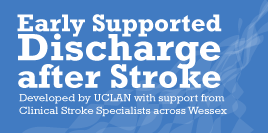Useful References
- Ellis-Hill CS. & Horn S (2000) Change in identity and self-concept: an new theoretical approach to recovery following a stroke. Clinical Rehabilitation 14:279-287.
- Ellis-Hill C (2011) Identity and sense of self: the significance of personhood in rehabilitation. Journal of the Australasian Rehabilitation Nurses' Association 14(1):6-13.
- Guise J, McKinlay, A & Widdicombe S (2010) The impact of early stroke on identity: A discourse analytic study. Health 14(1):75-90.
- Clarke P & Black SE (2005) Quality of Life Following Stroke: Negotiating Disability, Identity, and Resources. Journal of Applied Gerontology 24(4):319-336.
- Haslam C, Holme A, Haslam AI, Jetten, J & Williams WH (2008) Maintaining group memberships: Social identity continuity predicts well-being after stroke. Neuropsychological Rehabilitation 18(5/6):671-691.
- Legg L, Stott D, Ellis G & Sellars C (2007) Volunteer Stroke Service (VSS) groups for patients with communication difficulties after stroke: a qualitative analysis of the value of groups to their users.’ Clinical Rehabilitation 21:794-804.
- Mold F, McKevitt C & Wolfe C (2003) A review and commentary of the social factors which influence stroke care: issues of inequality in qualitative literature. Health and Social Care in the Community 11(5):405-414.

